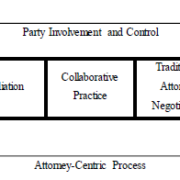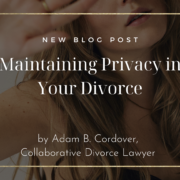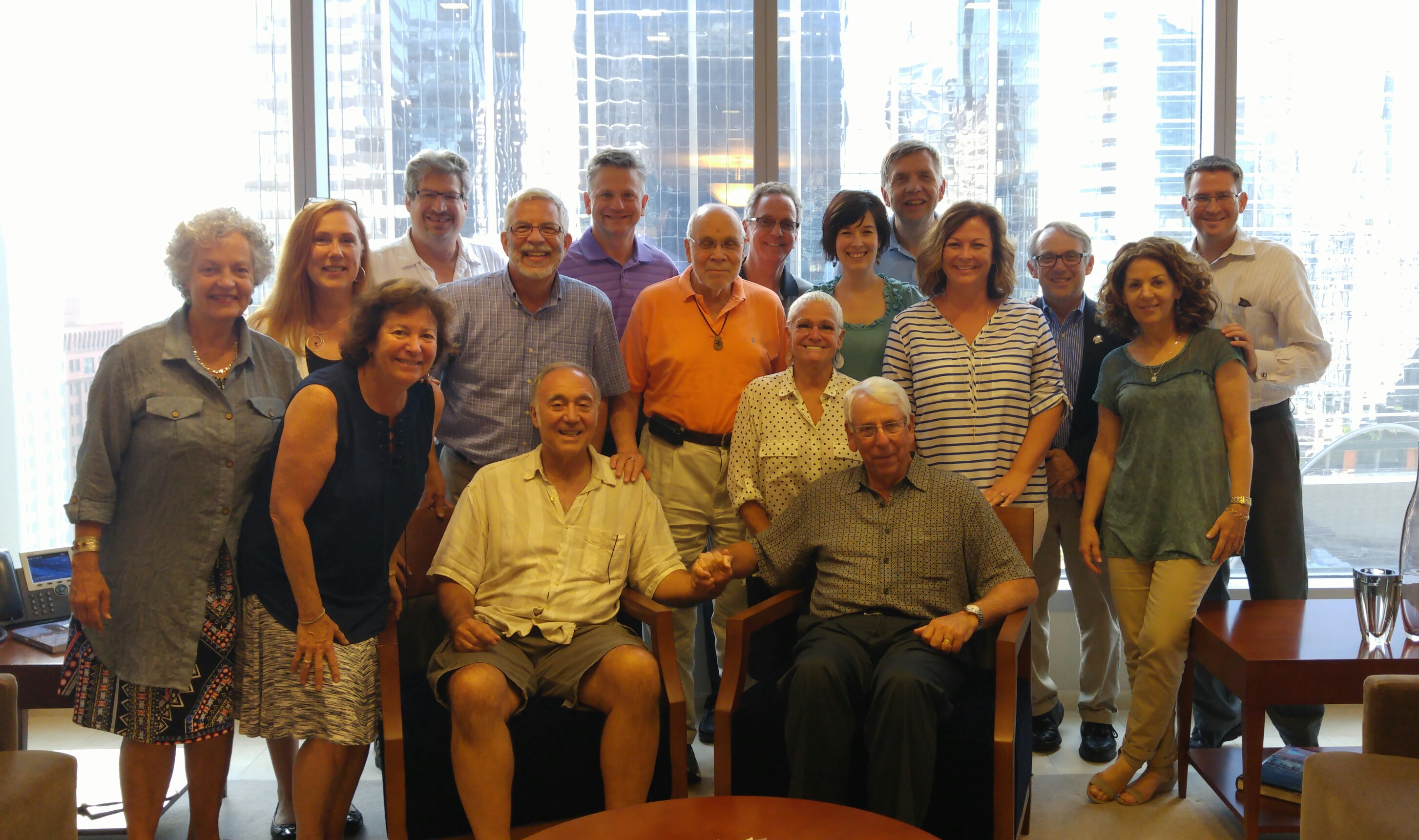Florida State University Business Law Student Interviews a Collaborative Lawyer
Anthony Mazzola
BUL 3310 – 0002
November 23rd, 2016
For this assignment, I had the pleasure of interviewing Adam Cordover. Mr. Cordover practices in Family Law and works for a company named Family Diplomacy: A Collaborative Law Firm. During the interview, I received a lot of great insight on a new field of law that I have never heard of before, and overall had a great, memorable experience. I mostly used the sample interview questions for this assignment, but I also added a few of my own as I listened to his responses.
-Why did you become an attorney?
“I became an attorney because I like to figure things out. I was always good with puzzles and it seemed like the law was encoded and used all of these complicated terms. I wanted to get to know what all these terms meant and how to decode these terms. Going through law school and becoming a lawyer has helped me out on that.” This response was really interesting to me because most of the time the answer to this question is to help better society or help people out, which is also true for Mr. Cordover as mentioned later, but the idea of law being like a complicated puzzle was a very interesting point to me.
-What type of law do you practice?
“I practice collaborative family law. What that means is that I help families who are going through divorce and other family law matters outside of court. I am not a divorce trial attorney. I practice exclusively out of court dispute resolution.“
Follow up – Are matters ever taken to court, or is it more of a mediation between the two parties?
“That’s a great question. I am a Florida Supreme Court certified mediator, but that is not primarily what I do. Collaborative family law is something that has been around since 1990 created by Stu Webb in Minnesota, but it has only been in Florida for the last 10-15 years or so. In Tampa Bay, it has only been widely used for about three or four years. As a collaborative attorney, I let the client know that I don’t go to any contested hearings. I represent one client, and another attorney represents the other client. Oftentimes, we’ll utilize a neutral mental health professional and a neutral financial professional to try and work things out until we reach an agreement. Certainly, I imagine there are cases where people can’t reach an agreement, but I know there’s a study by the International Academy of Collaborative professionals that says nationwide, collaborative cases are successful about 90% of the time. I personally have not been involved in a collaborative case where the parties could not reach an agreement. However, in the event that the parties could not reach an agreement, then they would essentially have to fire their collaborative attorneys and hire trial council.” Learning about collaborative family law was very interesting and it is a very cost effective, efficient way to settle disputes rather than spending mass amounts of money on legal fees and waiting ages to finally go to court to settle the dispute. Collaborative family law is a more private and effective way to resolve family matters.
-Do you like being an attorney? What do you like? What do you dislike?
“Yea! I do like being an attorney primarily because I can help people. I’m given an extraordinary amount of responsibility, and as an attorney, we are held to standards by the bar. We are given this responsibility, and I feel it that it is important to help people with this responsibility. I feel that often times attorneys receive a bad rap because of those few who don’t help people out. What I dislike about being an attorney, for me, is when attorneys, even though they don’t mean to, damage families. Sometimes, attorneys can be stuck in, ‘this is the way we do things because this is the way we’ve always done things.’ The idea of collaborative law is to help families move forward, and there a lot of attorneys who may not be willing to learn new skills and learn how to better adapt to help more families.”
-What do you think of the legal profession? What do you like? Dislike?
“Generally, I think the legal profession has a desire to do good and to help amongst most people. I think that too many people are stuck in traditional ways of doing things. There is not enough innovation, and sometimes that can get the legal profession stuck.”
-Do you feel differently about the legal profession today from when you first started practicing law?
“When I graduated, I was probably falsely optimistic because I didn’t know what I was getting into. I’ve been a leader in collaborative practice in Tampa, and have been really trying to push it as being a more peaceful, respectful way of moving forward. At first I ran into road blocks and a lot of resistance with it. This kind of made me pessimistic about it. However, over the past few years, as judges have gotten behind it, as new statutes has been passed, as more attorneys have been trained and mental health professionals recommending it, and as more and more families are experiencing it and telling others about it, I’ve once again become the optimist! I have seen many attorneys, many of whom I would have never thought would have changed their stripes, went from litigation attorneys to collaborative attorneys.”
-How do you use computers and technology in your practice?
“Technology is essential. First off, communication is huge. So much communication is done by email. Things like teleconferences are also important because we work in teams. I am starting to integrate online form builders into my practice. Family law requires people to fill out a lot of forms, and with the form builders, you can put in information once for one document and it populates it amongst all the different documents. It also makes it so that we are less likely to make a mistake. In the past, when I first started working with para-legals and others, often times people’s names could get misspelled. Here, you just enter information once and it gets entered everywhere.” I think the idea of a form builder is incredible, not only for this profession, but for everything that requires a mass amount of forms.
-What are your thoughts on para-legals?
“I think they are great. I think it is important that they are under the supervision of an attorney because they haven’t necessarily gone through law school and done the research that most attorneys have. But I think para-legals are a wonderful way to help clients more cost effectively. I have a para-legal, Jennifer, who a lot of times interacts with clients, and charges a must lesser rate than I do. Clients appreciate that we are trying to save them money. When it comes to substantive decision making, I come in and help out. When we go to meetings and such, I’m there with the client. Overall, I think para-legals are great.”
-What should one do to prepare for law school (courses, curriculum, etc)?
“I don’t think there is a course or curriculum that you need to do to prepare for law school. Pursue any undergraduate degree that you want. You don’t necessarily need to take anything that has anything to do with the law in undergrad. Find an undergrad major and minor that interests you and do those and if it’s different, especially, that may make you stand out to get into law school.”
-Would working for a law firm present valuable insight?
“It definitely would be a great opportunity. First off, it’s always good to have a job. You might get exposed to other areas that you like. It may be that you are working with them as an assistant and find an interest in what they deal with. You can be working in the IT department and jump start your IT career that way.” I mentioned that I know that a job anywhere leads to gaining great experience to help with a future job. I am sure working at a law firm allows people to gain valuable skills that they can either continue in the law profession or in another field.
-Is there one section of the country that may be better than another to consider practicing?
“I guess it just depends on what you’re interested in and what area of the law you want to get into. For example, if you were interested in the entertainment industry, you may want to go to California. If you were interested in the oil industry, you may want to go to Texas. If you are interested in the environment, specifically wetlands, you may want to stay here in Florida. It just depends on what you want to do. Just do what makes you happy.”
-What are your comments about the portrayal of attorneys, judges, and the legal system on television and cinema?
“I think that people often times believe what they see on TV. What they see on TV, specifically divorce, is that to divorce, you need to have attorneys argue or you argue in front of a judge and the judge makes a decision. The truth is that it rarely happens that way. Yes, there is arguing in front of a judge, but it may take year or two for a judge to make a decision. There are forms of private dispute resolution, such as collaborative practice, that aren’t as exciting for TV purposes, but they get the job done.”
-Looking back over your legal career, was it worth it? Or is there another road you wish you had taken?
“When I went to law school, I was also getting a masters in international affairs. I saw myself going into international business law, or contracts. I graduated law school in 2008, and that was also when the economy crash. I had difficulty finding a job, but ultimately I found a job in family law. Soon enough, I came to realize, especially when I stumbled upon collaborative law, that the skills and techniques that I learned in international relations also applied to domestic relations. I found that a lot of it is interest-based negotiation, and trying to figure out not necessarily what positions people are taking, but really what they need to move forward with their lives. At first, I was not sure about the path that I had taken because divorce was not an area I imagined myself being involved in. But I’m now happy that I did and happy that I can blaze a trail in this new area of collaborative family law and help more people. If I can help make the world a better place one family at a time, one child at a time, I’d say it is very much worth it.”
Lightly edited for clarity and content.
—
Adam B. Cordover is managing attorney at Family Diplomacy: A Collaborative Law Firm, as well as a member of the Board of Directors of the Florida Academy of Collaborative Professionals. Adam also is a founding and principal of the Tampa Bay Collaborative Trainers with whom he trains attorneys, mental health professionals, financial professionals, and mediators how to engage in collaborative practice.






Leave a Reply
Want to join the discussion?Feel free to contribute!